Excellence in Assessment (EIA) Designation
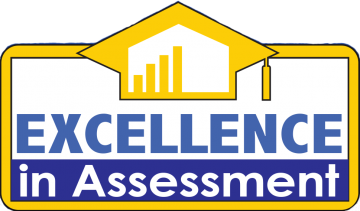
The Excellence in Assessment (EIA) designation, the first national initiative of its kind, recognizes institutions that successfully integrate assessment practices throughout the institution, provide evidence of student learning outcomes, and use assessment results to guide institutional decision-making and improve student performance. The EIA designation’s focus is on processes and uses of assessment data, rather than on student performance or accomplishment.
Building on the foundation of reporting both student learning outcomes assessment results and processes established in VSA Analytics, the EIA designation evaluation process is directly and intentionally built from NILOA’s Transparency Framework.
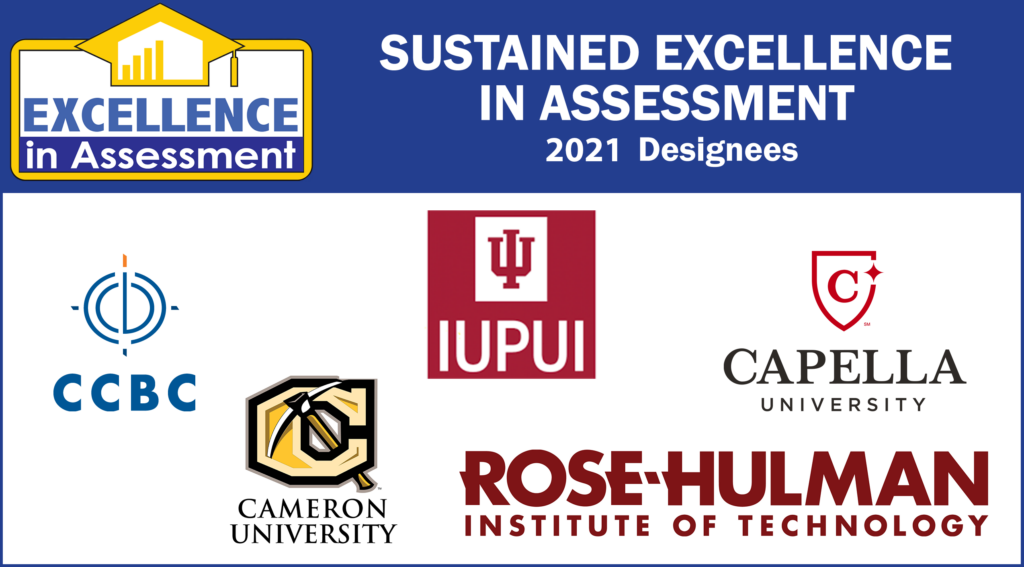 2021 Sustained Excellence Award Designees
2021 Sustained Excellence Award Designees
Cameron University
Cameron University is designated as Sustained Excellence in assessment through the commitment to continuing to improve on an already solid and mature system of assessment. Cameron University is doing an admirable job of involving and developing additional opportunities to incorporate external stakeholders in meaningful ways. Internally, the level of engagement and communication between the Institutional Assessment Committee and programs/units is impressive and a clear strength of Cameron’s assessment process. Additionally, the attention to rewarding faculty for participation in assessment activities formally through promotion and tenure, annual review, and service obligations assists in centering assessment work at Cameron.
Capella University
Capella University maintains the Sustained Excellence designation and is indeed an exemplar for transparency of outcomes coupled with quality teaching and learning processes. Capella’s websites continue to serve as an excellent tool for students, faculty members, and employers by communicating and tailoring evidence of student learning to various audiences. The assessment plan at the institution-level includes a logic model of how learning and change happens over time, meaning there is an institutional approach to learning management driven by learning and buttressed by accreditation standards. Capella has managed to build assessment processes that have become natural and sustained through leadership and organizational changes.
Community College of Baltimore County
The Community College of Baltimore County (CCBC) maintains the Sustained Excellence designation by continuing to practice excellence in assessment. From communication with partner institutions to varied stakeholder engagement across the college to the wide variety of committee work, various pieces connect assessment into a scalable meaningful process of engagement with student learning at CCBC. Additionally, the faculty-initiated, team-based assessment projects as well as recognition of assessment activities in the evaluation and promotion process for faculty are to be elevated. Given the level of maturity and sophisticated assessment infrastructure of CCBC, its institutionally tailored processes for assessment planning and evidence still allow flexibility for those engaged in the process to revise efforts to meet changing student needs.
IUPUI
IUPUI (Indiana University-Purdue University Indianapolis) maintains the Sustained Excellence designation with a strong narrative reflective of the journey to an integrative assessment culture. IUPUI continues to expand its understanding and knowledge of ongoing assessment, leaning into its strength of providing abundant opportunities for professional development both internally and externally, including making significant contributions to the field through the Assessment Institute in Indianapolis, the oldest and largest U.S. higher education event focused on assessment and improvement. There is high engagement of alumni, employers, advisory boards, and students in various and connected processes of assessment. The leadership, intentionality, and balanced approach to assessment across the institution at-large is of the guiding ship, or lighthouse quality. IUPUI’s assessment process offers institutions of any size a model to consider, emulate, or replicate to a scale reasonable for their institution and its mission.
Rose-Hulman Institute of Technology
Rose-Hulman Institute of Technology maintains the Sustained Excellence designation with an impressive systematic and longstanding process of assessment. Rose-Hulman’s view of accomplishment of institutional-level assessment, shareable with internal and external stakeholders, is well situated with a large number of artifacts (over 2,000!) evaluated annually, along with strong stakeholder participation. Accessibility of up-to-date, real-time data in dashboards as well as regular discussions of assessment data within committee work allows for those at Rose-Hulman to know what data are available, where to find it, and how to use it.
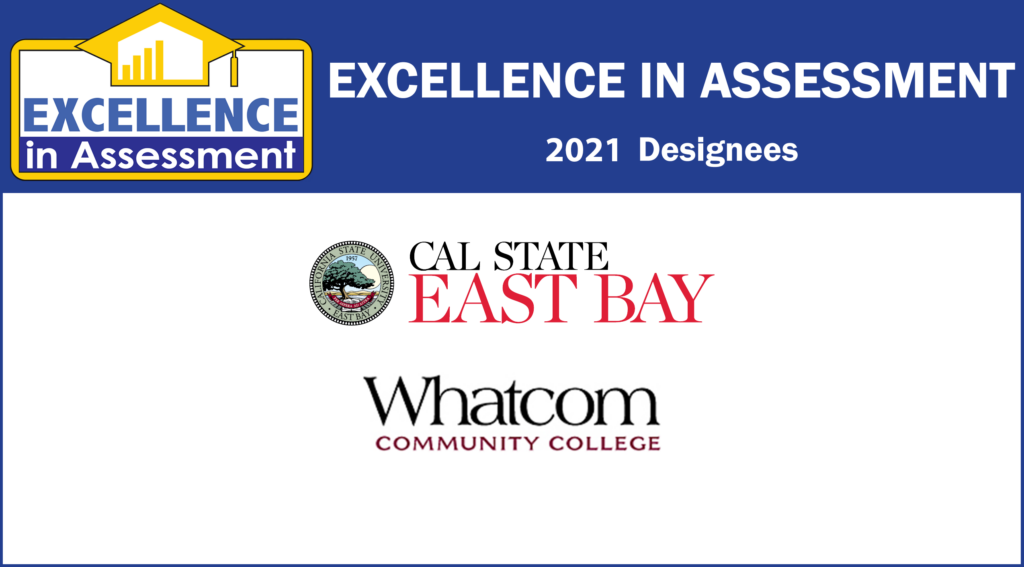 2021 Excellence Award Designees
2021 Excellence Award Designees
California State University-East Bay
California State University East Bay’s (CSUEB) narrative highlights quality assessment practices at work. CSUEB’s interconnected and dynamic processes collectively operate at the course, program, and institutional levels to advance improvements in students’ learning experiences. CSUEB’s collaborative approach to assessment is commendable. CSUEB has a remarkable repository of information on their website and the integration of assessment activities makes for an efficient process and maximum use of student work and data for meaningful institutional self-reflection and improvement.
Whatcom Community College
Whatcom Community College has put significant time and effort into making assessment a sustainable, integrated, and useful part of their institutional practices. Additionally, Whatcom has worked hard to develop an organized and sustained effort at involving faculty and staff, including adjunct faculty, in assessment planning and implementation processes. Whatcom’s assessment and institutional research website is rich with evidence of assessment changes which is monitored and communicated publicly to stakeholders across the institution. Whatcom Community College’s transparent and honest evaluation of their practices is refreshing.
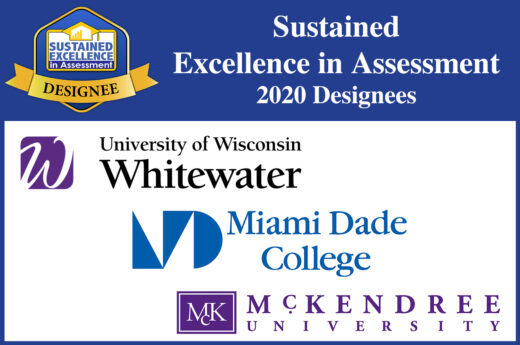
2020 Sustained Excellence Award Designees
McKendree University
There are many innovative programs and services at McKendree University, including online and blended programs, community-based learning, graduate programs, and engaging professional development programs, that speaks to their mature and enhanced assessment processes focused on relevant outcomes. For example, the Responsible Citizenship, Engagement, Academic Excellence, and Lifelong Learning (REAL) initiative, provides a means for the campus community to understand and communicate about shared work. Additionally, REAL provides the framework for the university-wide assessment initiatives which have been modified and refined over time to build campus community and support student learning. McKendree continues to inspire and are to be commended for their culture of assessment, relevant, useful, systematic, transparent, and generalizable assessment activities. These gains are driven by faculty and staff, with the support of the Office of Academic Affairs and the Office of Student Affairs.
Miami Dade College
Miami Dade College has a long, deep assessment history and a commitment to improving student learning for their culturally diverse student population. With approximately 90,000 students–three-quarters of whom are Hispanic, three-quarters of whom work while attending, and the majority from low income households–Miami Dade provides a path to economic and social mobility which undergirds their institutional commitment to high-quality teaching and learning experiences. Miami Dade’s organizational infrastructure, the Learning Outcomes Coordinating Council and Learning Outcomes Assessment Team, include seasoned, prominent faculty, recently hired faculty, and advisory members from student services, academic administration and students–all of which represent the diversity of the Miami Dade community and testament to their commitment to equity.
University of Wisconsin Whitewater
For almost 30 years, the University of Wisconsin-Whitewater has supported meaningful and quality assessment of student learning. Supported by top administrators, dedicated faculty, and staff, UW-Whitewater works in concert to create a meaningful assessment system. They enjoy a structure coupled with processes that facilitate thoughtful discussion and use of student learning data as a basis for curricular changes and institutional decision-making. For example, UW-Whitewater’s Essential Learning and Review Committee (ELARC) is a university-level committee charged with reviewing data from academic and co-curricular units and making data-based recommendations for campus assessment, professional development, and resource allocation. Finally, UW-Whitewater also provides a rich mix of incentives, rewards, and funding for assessment projects to support ongoing engagement in assessment.
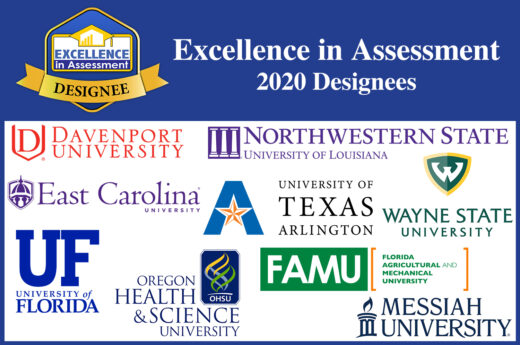
2020 Excellence Award Designees
Davenport University
Davenport University has a clearly articulated vision, purpose, and function for assessment. Serving more than 7,200 students, Davenport has made significant progress on their approach to assess, analyze and act on student learning outcome data. Guided by engagement of key internal and external stakeholders, results of their culture of quality and data-driven decision–making include increased retention, graduation rates, and student and employer satisfaction, among other performance indicators. Additionally, the Excellence System Certification Process, a new innovative initiative at Davenport, highlights a rigorous faculty review of student learning outcomes performance through assessment of artifacts.
East Carolina University
East Carolina University (ECU) is intentional and focused on student learning achievement. As one reviewer commented, East Carolina is on the way to becoming a national leader in the assessment of learning outcomes. ECU’s wide variety of information and resources are shared, via a public-facing transparent website, to support professional development. Within an environment of a dynamic global health crisis, ECU has not wavered in its commitment to provide continuity in instruction, assess student learning to ensure faculty and staff are able to continue refining efforts, and share assessment of student learning with stakeholders.
Florida Agricultural & Mechanical University
Florida Agricultural & Mechanical University’s (FAMU) goal to enhance effectiveness by the use of best practices allows them to implement an assessment process that leads to quality programs and service improvements. With guidance and leadership from the Office of University Assessment, connections between meaningful assessment activities and professional development activities are explored and celebrated. From a new assessment rubric to an annual Assessment Day, a mini-conference style professional development opportunity, FAMU illustrates commitment to continuous improvement that is inherent in a strong assessment program and effective reporting process.
Messiah University
Messiah University benefits greatly from clear, vocal, and persistent support of assessment efforts from institutional leadership. For instance, Messiah has achieved great strides in advancing assessment, including important updates to assessment policies which codified their increased commitment to learning outcomes assessment. Additionally, Messiah’s assessment office regularly hosts trainings where assessment of student learning is supported through the teaching and learning office. Because of these investments, the Messiah community is able to engage more meaningfully with evidence of learning and use that evidence to make improvements in teaching, assessment, and curricula.
Northwestern State University
Northwestern State University demonstrates mission success by leveraging data-driven decisions designed to drive the institution toward its vision of becoming the nation’s premier regional university. Through robust action plans focused on enhancing student learning, program growth, and institutional improvement, the Northwestern State University community involves a cross-section of several groups, including senior leadership, faculty, staff, administrators, and student representatives in the assessment process. Additionally, Northwestern State has significantly increased the emphasis on student learning by shifting from a narrative focused on institutional effectiveness to one that stresses student learning experiences.
Oregon Health & Science University
Oregon Health & Science University (OHSU) is committed to a culture of evidence-based decision making and is moving towards becoming a national leader in health and science innovation. Substantial progress has been made in growing the assessment enterprise including contributing to assessment scholarship, and drawing on their own data and existing research to guide change. Likewise, OHSU’s updated Assessment Academy trainings highlight current trends in the assessment world including communicating and sharing assessment results and reports. Finally, OHSU incorporates a more nuanced data collection of stakeholder engagement, which highlights the various levels at which stakeholders can be engaged in student learning.
University of Florida
The University of Florida’s (UF) mission places student learning at the center of their work. To meet that mission, faculty enable student learning in discipline appropriate ways and use assessment methods that are authentic to their disciplines. For example, each college and academic undergraduate, graduate, professional, and certificate program has developed its own mission to align with and support UF’s institutional mission. Further, 93% of students in the 2018-2019 academic year met the faculty’s student learning outcomes threshold for success. These achievements, combined with their student success metrics provides a comprehensive view of student success at UF.
University of Texas at Arlington
The University of Texas at Arlington (UA) has a rich institutional commitment to outcomes assessment and a commitment to meaningful and informed improvement. The institution-wide Unit Effectiveness Process is thorough and integrated for continuous improvement. From increased diversity, and program offerings, to instructional modalities, UTA is inching towards greater inclusion and an increased commitment to building a culture of assessment. Additionally, the UTA website maximizes the effort to reach more stakeholders and make the language of assessment understandable and accessible to others.
Wayne State University
University leadership at Wayne State University embraces assessment processes and models that commitment for faculty and staff. Faculty and staff at all ranks provide content expertise and determine priorities, while the University Assessment Council and the Director of Assessment contribute support for the process. A few years ago, Wayne State created a grant program and travel support for scholarly presentations on assessment which has enabled professional development and broadened engagement in assessment. Additionally, since 2012, Wayne State’s graduation rate has nearly doubled, and racial disparities have decreased. And because of their commitment to a culture of assessment, COVID-19 was met head on with data-informed decisions.
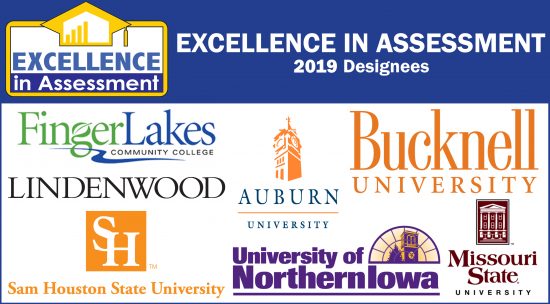
2019 Sustained Excellence Award Designee
Finger Lakes Community College
The only college designated Sustained Excellence this year, Finger Lakes Community College’s application exemplifies the focus of the EIA designation. Through its various visuals and reporting formats, FLCC works to put as much energy into meaning-making of assessment results and attractive, clear, and candid assessment communications as it does in generating assessment results to communicate what they’re doing, how well, and why. While supported by administration, assessment of student learning at FLCC is grounded in shared governance and faculty-led, including the use of faculty assessment coaches who help guide their peers in teaching and learning dialogues, the hallmark of its process. Impressively engaging and thoughtfully conceived, FLCC’s assessment process encompasses external expectations as well as the core internal/programmatic expectations, a balancing act that often does not happen at institutions.
2019 Excellence Award Designees
Bucknell University
Bucknell University’s comprehensive assessment process centers on a team of people who deeply care about student learning. Through their guidance and growth, along with elevating student voice in its assessment activities, Bucknell continues to creatively use resources and incentives in its approach to engage stakeholders and reward partnerships. An exemplar practice of transparency, the Statistics on Our Assessment Practice and Evidence of Student Learning dashboards, are two examples of Bucknell’s commitment to usefulness of student learning data.
Auburn University
Auburn University’s faculty-led assessment process is quite impressive, especially for an institution of its size. Wide stakeholder engagement was necessary for the creation and further implementation of its Quality of Assessment Rubric, along with its centralized general education efforts (known as the SCORE). Auburn’s collaborative and integrated approach to assessment was built upon its guiding philosophy as a faculty support resource on campus. Auburn’s compelling institutional research questions, intentional process of involved decision-making with faculty and staff in order to support and shift the culture of assessment, responsive nature of the assessment personnel, and the infusion of literature into practice are noteworthy in approach.
Lindenwood University
Lindenwood University’s assessment approach centers on multiple forms of outreach for faculty and staff to participate and learn from one another to allow for engagement, connection, and support of its assessment activities. The Assessment Summit, an effective setting to share and use results, and the Assessment Tips weekly newsletter, a medium to share common practices within the institution, are just two examples of outreach in sharing results. Connecting its plentiful indirect measures and standardized scores to more direct measures of student learning across general education, Lindenwood is leveraging resources and opportunities for engagement to gather useful results to provide a more complete picture of student learning.
Missouri State University
Missouri State University’s thoughtful assessment process centers on a commitment to relationship-building and trust. Part of this is the effective use of college-wide meetings and workshops to communicate assessment results. A particular standout is the workshop series planned to execute strategies needed to provide useful assessment results, make meaning of such results, and brainstorm ways to effectively communicate information back to key stakeholders. The review of over 10,000 student artifacts in MSU assessment history is not only impressive, it also allows Missouri State to tell an intricate, contextual story of student experience and learning.
Sam Houston State University
As Sam Houston State University continues to build on a robust and comprehensive assessment approach, with a narrative that beautifully weaves state accountability demands with relevant questions about student learning. Using a wide variety of direct and indirect measures, SHSU is able to tell a story of students’ learning and experiences at the University and to highlight examples of how SHSU uses robust evidence of student learning and success to implement improvements ranging from policy to curricular revisions. It is clear that meaning-making of assessment results is not only important but central to SHSU’s assessment efforts.
University of Northern Iowa
University of Northern Iowa’s intentional, integrated, and transparent assessment approach involves an extensive, layered assessment plan allowing for multiple points of involvement and collaborative opportunities for discussion among faculty and staff, an important part of assessment’s value for learning. The annual set of data-based Vitality Metrics, produced to complement information from student learning outcomes assessment, along with a heavy emphasis in recent years on direct assessment of learning, equips faculty and staff with the knowledge of data on which decisions are made as well as the ability to use evidence of student learning to improve their own teaching and learning practice.
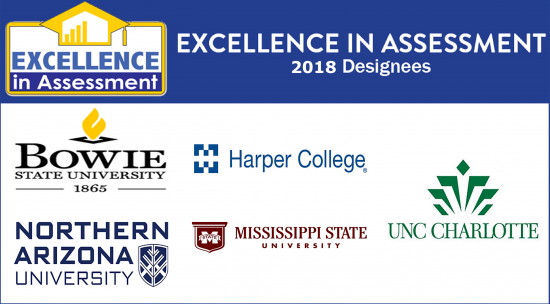
2018 Excellence Award Designees
Bowie State University
The first Historically Black College and University (HBCU) EIA designee, Bowie State University’s strength lies in the widespread collection of assessment data and analysis, as well as participation in assessment activities on its campus. Assessment information and faculty development resources are readily available on its Center for Academic Programs Assessment (CAPA) and Center for Excellence in Teaching and Learning (CETL) websites. With Bowie State University’s ability to foster strong partnerships, engagement of internal and external stakeholders will continue to be an asset.
Harper College
Harper College’s strength of its assessment process is its focus on inclusion of a wide variety of stakeholders in substantive ways. Particularly, its engagement of advisory boards is not only practical but also a process to be replicated. Using its assessment management system to assist with the integration of multiple data sources as evidence to improve student learning on its campus is just one example of integration at Harper. Harper College’s Community of Practice is an especially compelling example of faculty engagement and support, alongside recognition of this work within the promotion and tenure process.
Mississippi State University
Mississippi State University continues to implement effective evidence-based practice into its current assessment process. Using a bottom-up approach to improve teaching practice and administrative services, Mississippi State University has done considerable work to embed assessment throughout the campus. Extensive committee engagement, integration of its learning outcomes (institution-, program/unit-, and course-level), comprehensive assessment templates, and one of its most robust practices distributing and sharing campus-level results of student assessment are key to its success.
Northern Arizona University
Northern Arizona University’s intentional, reflective culture of assessment allows for clear, student-motivated, quality-driven curriculum, instruction and assessment for all key stakeholders. Northern Arizona University has found success in engaging faculty and staff in integrating multiple data sources and assessment measures in its efforts to use campus-level evidence of student learning. By putting appropriate assessment mechanisms in place, Northern Arizona University is able to attend to its diverse stakeholders and articulate meaningfulness of its assessment process, thus bringing attention to the ‘why’ of assessment.
University of North Carolina at Charlotte
The University of North Carolina at Charlotte’s thoughtful approach to its assessment infrastructure to make its assessment efforts meaningful is quite impressive, especially for an institution of its size. Appropriately reflecting on its strengths and weaknesses, UNC Charlotte is well-served in terms of support and staffing for its assessment work. UNC Charlotte’s Assessment Fellows and recognition awards to committed faculty and staff promotes good assessment practice throughout the campus. Organized around the Transparency Framework, UNC Charlotte’s well-implemented assessment process assists not only in providing and using evidence to improve student learning on its campus but also in its transparency efforts.
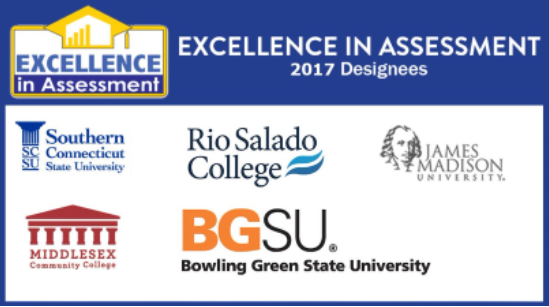
2017 Sustained Excellence Award Designees
James Madison University
Faculty and staff at James Madison University have worked hard for the past two decades to develop an intentional, student learning informed, embedded approach to assessment. James Madison University has been nationally recognized for its assessment practices, most recently the weigh pig, feed pig, weigh pig approach to improvement. Not only has James Madison University evidenced student growth in each of its five learning clusters, it continues to see efficacy of its redesigned general education program over the last 20 years. Formal recognition of faculty and staff commitment to excellence in assessment is, for many departments, a part of the promotion and tenure process that continues to advance learning improvement on its campus. Additionally, James Madison University provides assessment support college-wide through 11 assessment professionals, over 100 faculty and 40 staff coordinators, and 15+ graduate students who serve as assessment professionals in training.
2017 Excellence Award Designees
Bowling Green State University
Bowling Green State University’s strength in its assessment process lies in its innovative engagement of internal and external stakeholders. Particularly, the development of Student Learning Analysts on campus serves as a creative model of student engagement others may replicate. Bowling Green State University’s thoughtful approach to assessment emphasizes the need for cross-campus committee membership, providing space for reviewing data with multiple stakeholders, and sharing and communicating data with a variety of groups. Educating nearly 20,000 students annually, Bowling Green State University continues to strategically use evidence to guide decision-making.
Middlesex Community College
Middlesex Community College’s culture of assessment includes a well-scaffolded assessment infrastructure of shared expectations and alignment of student learning at its institutional, program, and course levels. Campus-wide commitment to assessment is found in Middlesex Community College’s shared governance structure in developing and assessing its six institutional learning outcomes. Documenting the impact of curricular changes, intentional engagement of faculty, key stakeholders, and students throughout its assessment process, integrating co-curricular learning, and availability of campus assessment resources provide evidence of Middlesex Community College’s commitment to excellence in assessment.
Rio Salado College
Rio Salado College has worked hard to refine, align and integrate its Total Quality Management Plan-Do-Check-Act (PDCA) cycle campus-wide. Serving over 55,000 students annually and more than 27,000 students online, Rio Salado College continues to foster a culture of assessment on its campus with a commitment to meaningful assessment. Rio Salado College has developed a model that facilitates intentional collaboration between full-time and adjunct faculty in relation to assessment of student learning on campus. For students, Rio Salado College offers the Student Learning Outcomes Work Lab (OWL), which helps facilitate mastery of its five college-level learning outcomes. Integrating assessment data into its strategic plan and the recent development of its home-grown Assessment Data Display supports efforts in making evidence of campus-level learning transparent.
Southern Connecticut State University
Southern Connecticut State University’s use of evidence of student learning from a variety of assessment methods provides a big picture of learning on its campus. Wide stakeholder engagement, use of data analytics, student involvement in survey development, and robust examples of rubric development support its inquiry-driven assessment and institutional effectiveness work. Integration of various programs and activities, including participating in several national and even international initiatives, creates innovative assessment practice and better supports student learning on Southern Connecticut State University’s campus.
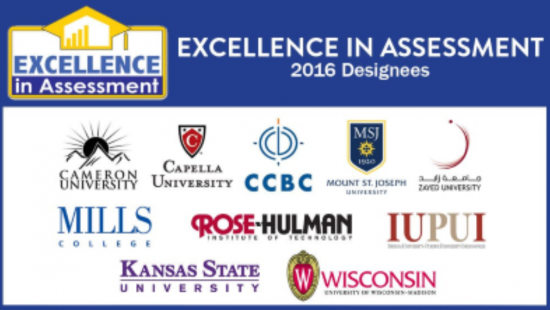
2016 Sustained Excellence Award Designees
Community College of Baltimore County
The goal of assessment at CCBC is to ensure the best conditions for learning, encourage best practices, and inspire creativity and innovation. CCBC has been lauded for its work in assessment and has been a national leader in assessment of student learning for many years. Nationally recognized as a leader in innovative strategies, CCBC educates more than 65,000 learners yearly, enrolling more than any other two-year college in Maryland.
Indiana University-Purdue University Indianapolis
IUPUI was an early adopter of assessment for improvement and accountability and has cultivated a campus ethos of transparency. In the 1990s, IUPUI adopted the Principles of Undergraduate Learning (PULs), which centered on learning, ways of knowing, and habits of mind. IUPUI is currently implementing a new strategic plan, Our Commitment to Indiana and Beyond, that reaffirms student learning and success as its highest institutional priority. Assessment thrives on a campus committed to using evidence-based practice in both undergraduate and graduate/professional education and to building and sustaining assessment capacity through professional development.
Kansas State University
Kansas State University’s approach to assessment emphasizes faculty ownership, which is considered the foundation upon which institutional assessment efforts are built. Ownership and broad levels of involvement are the foundation supporting the assessment culture developed at Kansas State. Academic programs use their assessment processes to update curricula and improve student learning and the Office of Assessment supports faculty and fulfills external reporting obligations. Kansas State’s university-wide assessment culture is focused on improved learning within disciplines. Kansas State’s assessment systems have led to many substantial changes including instructional and curricular adjustments, clarification of expected learning, and deeper analysis of the campus-wide experience.
Rose-Hulman Institute of Technology
Since 1998, Rose-Hulman has had a well-established set of campus-level student learning outcomes statements and a comprehensive campus-level assessment plan. For the past two decades, assessment experts in the Office of Institutional Research, Planning and Assessment have collaborated with faculty and student affairs staff to collect meaningful assessment data. They continuously engage in meaningful discussions about the state of campus-level outcomes assessment and areas of improvement to further their efforts. Their outcomes align with the institutional mission and describe the knowledge, skills, and attitudes expected of their graduates. Rose-Hulman is currently in the process of revamping their entire campus online infrastructure to further enhance their ability to communicate with both internal and external stakeholders.
2016 Excellence Award Designees
Cameron University
Cameron University has various processes in place to ensure student learning is the top priority. To meet the needs of students, it continually evaluates the quality of programs to determine whether changes are warranted. Over the last 20 years, Cameron University has documented an extensive commitment to assessment and enjoyed a campus-wide commitment to the assessment process. Positive student learning outcomes, engagement in, monitoring of, and compiling of assessment results at both the program- and campus-level are their signature accomplishments.
Capella University
Since 2002, Capella University has offered degree and certificate programs through an online learning-outcomes and competency-based curriculum, catering to its student population, non-traditional adult learners with an academic experience relevant to their personal and professional goals. Capella’s assessment efforts are hallmarked by an emphasis on continuous improvement that demonstrates an assessment approach across the university community. The university created Competency Map, a custom dashboard for learners and faculty that shows course competency assessment in real time. And in 2009, Capella launched the public website CapellaResults.com to document each program’s expected and demonstrated learning outcomes and to provide transparency of their graduates professional accomplishments.
Mills College
Mills College has been exceptionally active in assessing student learning. The broad representation of the college’s Assessment Committee provides the support and guidance that has enabled it to create a cohesive strategy for its learning assessment program. Mills’s assessment program uses many lenses through which student learning is assessed, from the level of institution-wide learning, to core programs, to each of their many academic and co-curricular programs. The college purchased a sophisticated software program allowing them to not only centralize all assessment components, but to align the learning goals of each to create a visual means of targeting assessment processes at the institutional level. Mills College is interested in and committed to learning as an institution about the methodology of collecting and analyzing data on learning. It’s also focused on designing and implementing a sophisticated and sustainable framework for putting that evidence to use.
Mount St. Joseph University
Mount St. Joseph’s has been engaged in formal assessment for over 20 years and has developed a culture of assessment that covers all areas of student learning, both curricular and extra-curricular. Development of this culture has led to demonstrated improvement in curricular design, learning outcomes, and student experiences, supported by institutional leadership with significant investments of time and resources. The university’s pathway to excellence in assessment includes appointing a faculty member as Assessment Coordinator, the creation of an Academic Assessment Committee, the initiation of curriculum mapping at the program and baccalaureate levels, and the creation of the Center for Teaching and Learning Excellence. Effects of their work are evidenced in the amount of faculty engaged, with at least one-fourth of their faculty presenting or publishing research on assessment.
University of Wisconsin-Madison
High-impact practices and student engagement are at the core of what UW-Madison refers to as the Wisconsin Experience, where they aspire to provide a learning environment that produces graduates who think beyond the conventional wisdom; are creative problem-solvers who know how to integrate passion with empirical analysis; know how to seek out, evaluate, and create new knowledge and technologies; adapt to new situations; and are engaged citizens of the world. The University of Wisconsin-Madison has had formal assessment processes in place since 1991. Since then, the institution has worked to integrate assessment into the education experience through a formalized assessment plan, an assessment fund to support specific projects, and an assessment committee of faculty and academic leaders to oversee and advance student learning. In 2008 to keep in pace with the national direction of assessment, UW-Madison adopted the Essential Learning Outcomes promulgated by AAC&U as overarching learning goals for their undergraduate program. Since 2014, they have made documented progress and are currently in the second year of a three-year project to collect learning goals and assessment plans from every academic program, and then establish a reporting and renewal cycle with nearly 100 percent participation by academic programs at all levels.
Zayed University
Zayed University is an international learning outcomes-based institution that has established a set of institutional and major learning outcome statements. They continue to assess student learning in a systematic and sustained manner by constantly working towards effectively closing the loop. Regular professional development activities highlight key aspects of their assessment process. They have also been successful at providing ongoing improvement over the years that has been removing barriers and providing faculty with tools to facilitate effective planning, collection, analysis, and reporting of assessment results. Their commitment to good assessment practices have led them to post all of their annual assessment plans and reports on their website.
*IMPORTANT EIA INFORMATION*
For those institutions interested in applying, the application process for the EIA Designation is now located here: https://www.aacu.org/about/awards/excellence-in-assessment-designation.
Previous EIA Resources
- Past Information Session: View the Recording.
- Review the 2021 application packet.
- View the 2021 Evaluation Rubric used by reviewers to get a sense of the criteria used to evaluate Designees.
- Use the EIA Checklist to ensure everything is included.
- Designees are awarded in two tiers: 1) Excellence, for those institutions demonstrating strong leadership and commitment to building (or re-building) a culture of integrated assessment practices; and 2) Sustained Excellence, for those institutions who have sustained or evolved integrated institution-level assessment over a period of at least 5 years.
| Sandra Bailey Professor, Management Director of Academic Excellence Oregon Institute of Technology Year: 2016, 2017, 2018, 2019, 2020 | Laura Blasi Director, Institutional Assessment Valencia College Year: 2017, 2018, 2019 | Katie Boyd |
| Lea Bullard Assistant Director, General Education Assessment University of North Carolina Wilmington Year: 2016, 2017, 2018, 2019 | Tim Burrows Assistant Director of Assessment Virginia Military Institute Year: 2017, 2018, 2019, 2020 | Cindy Cogswell Director of Strategic Planning and Assessment Ohio University Year: 2019, 2020 |
| Nicholas Curtis Director of Assessment Marquette University Year: 2019 | Marjorie Dorimé-Williams Assistant Professor, Educational Leadership and Policy Analysis University of Missouri Year: 2019, 2020 | Linell Edwards Coordinator of Assessment & Evaluation University of Illinois at Urbana-Champaign Year: 2019, 2020 |
| Tami Eggleston Provost McKendree University Year: 2021 | Angela Felix Faculty Chair, Languages Rio Salado College Year: 2018, 2019 | Ashley Finley Senior of Advisor to the President and Vice President of Strategic Planning and Partnerships AAC&U Year: 2016, 2017, 2019, 2020 |
| Jodi Fisler Associate for Assessment Policy and Analysis State Council of Higher Education for Virginia Year: 2016, 2017, 2018, 2019, 2020 | Mary Kay Fleming Professor, Department of Psychology Mount St. Joseph University Year: 2017, 2018 | Keston Fulcher Director of the Center for Assessment and Research Studies Associate Professor, Graduate Psychology James Madison University Year: 2016, 2017, 2018 |
| Laura Gambino Associate Dean for Assessment and Technology Professor, Information Technology Stella and Charles Guttman Community College Year: 2016, 2017, 2018 | Faon Grandinetti-Crystal Director of Assessment College of DuPage Year: 2021 | Jeff Grann Academic Director of Assessment and Learning Analytics Capella University Year: 2017 |
| Rebecca Hong Senior Director of Educational Effectiveness and Assessment Loyola Marymount University Year: 2019, 2020 | Pat Hutchings NILOA Senior Scholar Year: 2019, 2020 | Natasha Jankowski Higher Education & Assessment Consultant Former NILOA Director Year: 2016, 2017, 2018, 2019, 2020, 2021 |
| Jillian Kinzie Associate Director, Center for Postsecondary Research & NSSE Institute Indiana University Year: 2016, 2017, 2018, 2019, 2020 | Joseph Levy Executive Director of Assessment and Accreditation National Louis University Year: 2021 | Ross Markle Founder, Managing Director DIA Higher Education Collaborators Year: 2019, 2020 |
| Elise Martin (Retired) Dean of Assessment and Professional Development Middlesex Community College Year: 2016, 2017 | Julia Matuga Associate Vice Provost for Institutional Effectiveness Bowling Green State University Year: 2016, 2017, 2018 | Brad Mello Associate Professor, Chair, Communications Saint Xavier University Year: 2019, 2020 |
| Rose Mince Vice President, Academic and Student Affairs Carroll Community College Year: 2017, 2018, 2019 | Brandon Nichols District Director of Accreditation, Assessment, and Educational Development District Office City Colleges of Chicago Year: 2019 | Verna Orr Post-Doctoral Researcher NILOA Year: 2019 |
| Judith Ouimet Senior Assistant Vice Provost, Curricular Development and Assessment Indiana University Bloomington Year: 2016, 2018 | Trevor Parry-Giles Professor, Department of Communication Director of Academic and Professional Affairs National Communication Association Year: 2016, 2017, 2018 | Loraine Phillips Association Provost for Academic Effectiveness Georgia Tech Year: 2016, 2017, 2018, 2019 |
| Nancy Quam-Wickham Professor of History California State University, Long Beach Year: 2016, 2017, 2018, 2019 | Rita Rahoi Gilchrest Professor, Communication Studies (Interim) Associate Dean of the College of Liberal Arts Year: 2016, 2018, 2019 | Lee Rakes Director of Assessment & Evaluation Virginia Military Institute Year: 2016 |
| Franz Reneau Director of Assessment Georgia Institute of Technology Year: 2020, 2021 | Tony Ribera Director of Assessment Rose-Hulman Institute of Technology Year: 2017, 2018, 2019, 2020 | Stacy Sculthorp Lead Assessment Specialist Capella University Year: 2018, 2019 |
| Linda Siefert Director of General Educational Assessment University of North Carolina Wilmington Year: 2016, 2017 | Martha Stassen Assistant Provost, Assessment and Educational Effectiveness University of Massachusetts Year: 2016, 2017 | Linda Townsend Director of Assessment Longwood University Year: 2016, 2017, 2018, 2019, 2020 |
| Jessica Turos Associate Director, Assessment Bowling Green State University Year: 2021 | Ereka Williams Associate Professor Administration and Instructional Services Year: 2017, 2018 |
For further information on the EIA Designation and application process, you can view the following webinar recordings:
- January 2020- The 2020 Excellence in Assessment (EIA) Designation Information Session.
- February 2016- Recognizing Excellence in Campus Assessment: Using the Excellence in Assessment Designation for Self-Assessment. You can also view a PDF version of the webinar.
The Excellence in Assessment Designation was previously co-sponsored by VSA Analytics, the National Institute for Learning Outcomes Assessment (NILOA), and the Association of American Colleges and Universities (AAC&U), and was endorsed by the Council of Independent Colleges (CIC).

